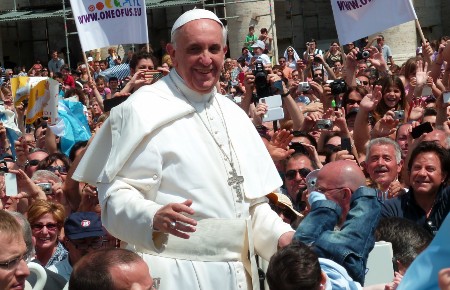We ask you, humbly: don't scroll away.
Hi readers, it seems you use Catholic Online a lot; that's great! It's a little awkward to ask, but we need your help. If you have already donated, we sincerely thank you. We're not salespeople, but we depend on donations averaging $14.76 and fewer than 1% of readers give. If you donate just $5.00, the price of your coffee, Catholic Online School could keep thriving. Thank you.Help Now >
Marco Girolamo Vida
FREE Catholic Classes
Italian Humanist, b. at Cremona about 1490; d. in 1566. He came to Rome under Julius II ; a priest and canon regular, he presented, in the rather lax Court, the greatest example of severity of morals. The Humanists were called upon to produce a great Christian epic. Vida undertook it, and in order that he might work at it Leo X gave him the priory of St. Sylvester at Frascati. The work, the "Christias", was not finished until after the death of Leo X (Cremona, 1535). The subject goes beyond the life of Christ and is in reality the establishment of Christianity, for Vida accords much space at the end of his poem to the spread of the Gospel. There is no mythological element in the six cantos; hence the unity of tone is more perfect than in Sannazaro's "De partu Virginis". Vida was also the author of short poems, such as "De Bombyce", "De ludo scaccorum" (on chess), and of a second serious and extensive work, "De arte poetica", written before 1520 (published in 1527). This didactic poem is interesting as an expression of the ideas of Humanism concerning poetry and because of its great influence. Vida dealt only with the ancients and their imitators, wholly neglecting writers in the vernacular. The general conception of his "Ars poetica" is inspired by Qunitillian. The writer takes the future poet almost at the cradle, and describes the education and care which he should receive. He instructs him in invention, composition, and especially style, emphasizing particularly the harmony of the verse and defining imitative harmony, examples of which, taken from Virgil, have passed into classical teaching, e.g. "ruit Oceano nox, procumbit-humi bos, conuolsum remis rostrisque stridentibus aequor". While Boileau exaggerates the difficulties of poetry and multiplies the duties of the poet, Vida undertakes to cultivate a taste for poetry and to remove the obstacles from the poet's path. In consequence of his plan Vida treats only of poetry in general. To him the model and prince of poets was Virgil, while he depreciates Homer, criticising his prolixity, repetition, and low style. He was the source of arguments later made use of in France by the partisans of the moderns; Vida was the first to assert that the word "ass" used by Homer did not belong to the noble style. He carried prejudice so far as to congratulate the Latin language for being ignorant of compound words so frequent in Greek. Vida's own style is elegant, clear, harmonious, and ordinarily simple. He was warm in admiration, especially in his eulogies of Virgil, but he is verbose, and if by chance he imitates Horace he dilutes him. The poem is now of interest only as a manifestation of Classicism in modern literature.
We ask you, humbly: don't scroll away.
Hi readers, it seems you use Catholic Online a lot; that's great! It's a little awkward to ask, but we need your help. If you have already donated, we sincerely thank you. We're not salespeople, but we depend on donations averaging $14.76 and fewer than 1% of readers give. If you donate just $5.00, the price of your coffee, Catholic Online School could keep thriving. Thank you.Help Now >








 Daily Readings for Friday, April 26, 2024
Daily Readings for Friday, April 26, 2024 St. Cletus: Saint of the Day for Friday, April 26, 2024
St. Cletus: Saint of the Day for Friday, April 26, 2024 Prayer before the Closing of the Day: Prayer of the Day for Friday, April 26, 2024
Prayer before the Closing of the Day: Prayer of the Day for Friday, April 26, 2024

